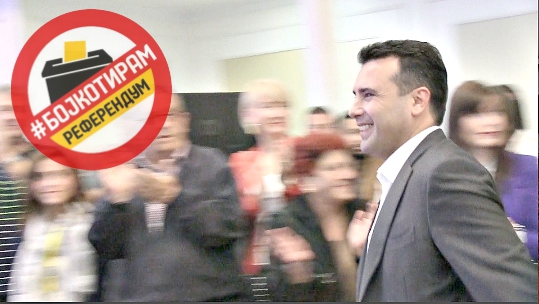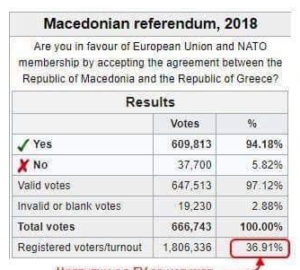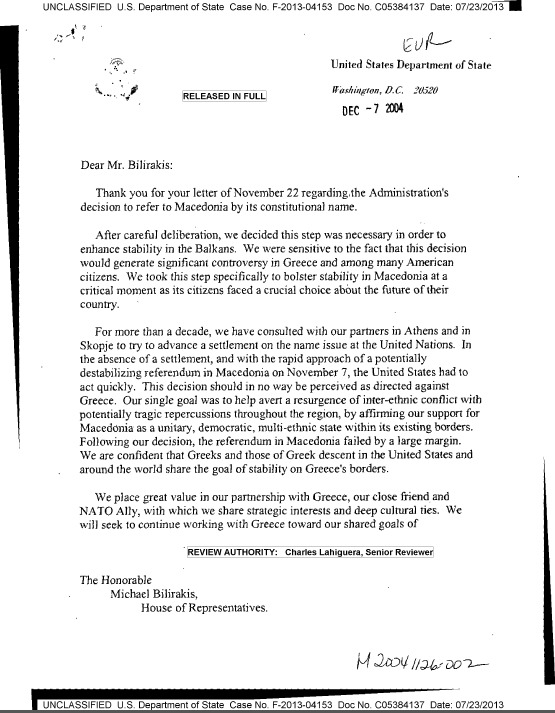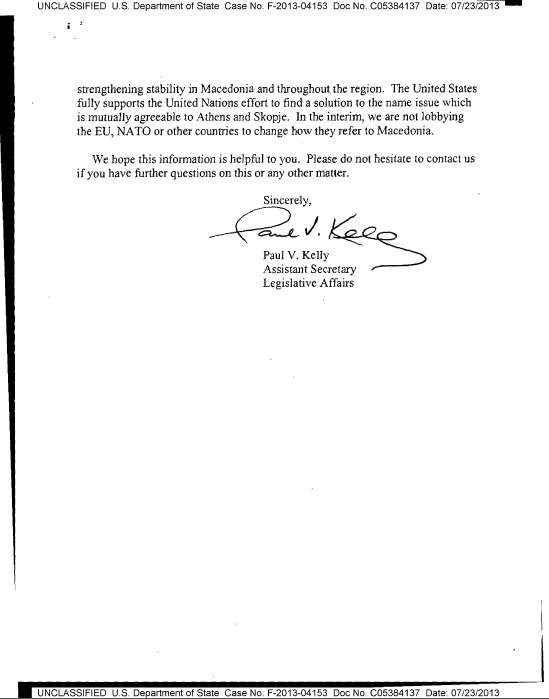
analysis/comment:
Sasha Uzunov
Skopje, Macedonia
REFERENDUM FARCE – the flop being hailed as a “success’ – we’ve all had over 24 hours to digest the outcome of Macedonia’s failed referendum held on Sunday 30 September, which is what it was despite the deliberate spin from the Zaev government and its foreign backers, namely US Ambassador to Macedonia Jess Baily.
By the Macedonia criterion for referenda, it did not reach the required 50% threshold of eligible voters needed but fell far short. The non-binding referendum question posed to voters was “are you in favour of the European Union and NATO membership by accepting the agreement between the Republic of Macedonia and the Republic of Greece?”
If you do a break down of the figures – 36.9% of eligible voters turned out and 94.18% voted in favour. Rough arithmetic that’s about 25 to 30% of all eligible voters voted in favour of the referendum. Simply put the vast majority of Macedonians and even a sizeable number of ethnic Albanians don’t want to change Macedonia’s name.
Regardless of how people voted or didn’t vote, what can’t be ignored is there was a movement/s dedicating to boycotting the referendum. If a large number of people didn’t turn out then that must be attributed to this movement. Obviously, regular voting patterns in Macedonia can’t be ignored.
According to German broadcaster Deutsche Welle, whose reporting has been skewed in favour of the Prespa Agreement:
“Macedonian Prime Minister Zoran Zaev has said the result is enough indication of support from the electorate for him to continue to push for implementation of the deal”
“MPs now have an obligation to make Macedonia a better place for all of us,” Zaev told reporters late on Sunday” – see link here
So it’s now hard for PM Zaev to claim a moral mandate over the main Opposition party VMRO-DPMNE led by Christian Mickovski to support the Prespa Agreement through a parliamentary vote.
Zaev needs a two-thirds majority – 80 out of 120 MPs to vote in favour. At the moment he doesn’t have the numbers. But has stubbornly vowed to push on and change Macedonia’s name and backed by the EU and the US who have hailed the referendum flop a “success.”
2004 MACEDONIA REFERENDUM JUXTAPOSITION – The US State Department letter reveals the real reasons for the US recognising Macedonia in 2004: to kill off a referendum that would if successful oppose the territorial reorganisation of Macedonia – the objective of the reorganisation was to lead to municipalities with artificially constructed Albanian majorities and place the country onto the path of de facto federalisation. see link here
We’ve seen enormous contradictions over the Prespa Agreement, the basis for the referendum on 30 September 2018. This controversial deal aims to change Macedonia’s name and identity to appease Greek nationalist demands in exchange for Greece removing its veto over Macedonia’s NATO and EU membership. It’s simply for US strategic needs – meaning to keep Washington’s longtime ally Greece happy but it’s been dressed up as being favourable to Macedonia. see link here
The standard mantra from the Macedonian Prime Minister Zoran Zaev, who immediately after the referendum flop broke a promise that he would resign if it failed, is the Prespa Agreement was the best possible deal that Macedonia could get and was the result of Greek and Macedonian compromise.
TENSIONS & CONTRADICTIONS OVER THE PRESPA AGREEMENT
One of his senior cabinet ministers, Justice Minister Renata Deskoska doesn’t even know who wrote the agreement, which is an incredible and embarrassing admission to make.
Macedonia’s Defence Minister Radmila Sekerinska, when asked if an American academic and ex US State Department official Dr Amanda Sloat was the real author, exploded with inexplicable rage.
The woman who is alleged to have put the agreement together, Dr Sloat, has remained silent despite being contacted and asked to set the record straight.
What is telling is the US Ambassador to Macedonia Jess Baily after also being asked to comment more than a month go if there was any US involvement behind the scenes declined at that time until he was confronted at a doorstop interview yesterday where he gave an answer after an OSCE post referendum media conference. The OSCE was tasked in monitoring the referendum for any irregularities.
Ambassador Baily was asked at point blank about Dr Sloat’s involvement. In an amazing display after deliberately walking past in an attempt to ignore the question he decided to comeback and stand his ground and answer the question in which he maintained the mantra of it – the Prespa Agreement – being the product of Greek-Macedonian negotiations.
It would have looked horrible if the man who has staked his diplomatic career on the Prespa Agreement was seen to run away from it.
This isn’t Ambassador Baily first time to dodge a question over the controversial agreement.
If it takes all of this effort just to get a response over the Prespa Agreement – using pliers to extract words out of key people’s mouths figuratively speaking – despite all the positive spin placed on it then this suggests there is clearly something wrong with it.
The US is riding roughshod over Macedonia’s sovereignty by Ambassador Baily taking such an “active” role in now pushing the Prespa Agreement through the parliament after the failed referendum.
Support for the US Macedonia was historically high especially amongst the diaspora – that has dropped remarkably because of the antics of Ambassador Baily and without Russian strongman Putin needing to lift a finger.


